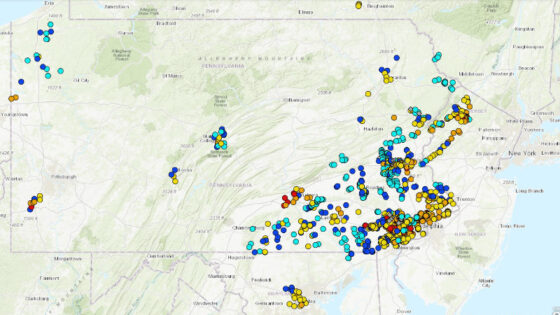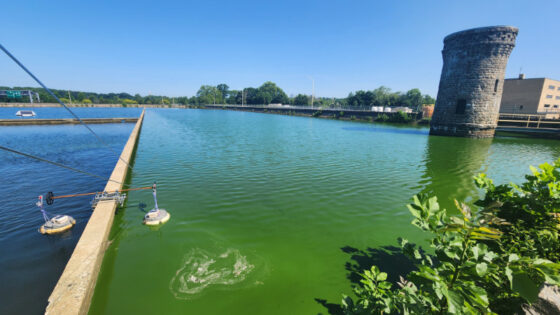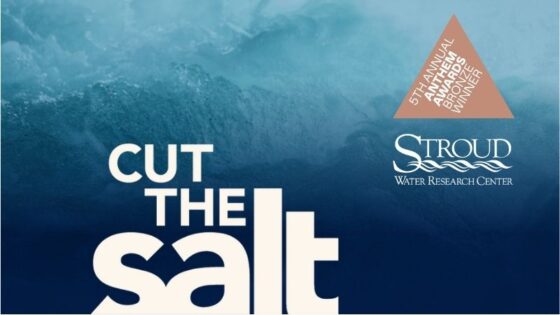This article was originally published in Stroud Water Research Center’s 2019 annual report.
By Paul Joyce, Ed.D., Tara Muenz, and Mandy Nix
Nestled within the Brandywine, Chester, and Ridley Creek watersheds and a stone’s throw from Stroud Water Research Center, West Chester Area School District (WCASD) serves a 75-square-mile region in central Chester County, Pennsylvania. Here, the district is known for its diversified businesses and historic countryside in suburban, urban, and rural communities. Each day, the hallways of its 10 elementary schools, three middle schools, and three high schools are flooded with nearly 12,000 students from the West Chester Borough and seven surrounding townships.
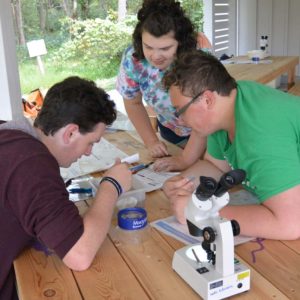
“The district values student acquisition of knowledge, concepts, and skills necessary to succeed in an ever-changing, 21st century, global society,” says WCASD Science and Technology Education Supervisor Paul Joyce, Ed.D. “This includes global citizenship among our students, which transfers directly to the need for watershed education and stewardship.”
The district’s commitment to high-quality watershed education and stewardship led them to the Stroud Center in the spring of 2017, when a group of WCASD teachers and administrators toured the Stroud Center’s LEED Platinum building, streamside outdoor learning stations, and experimental watershed, to learn about the educational opportunities offered by the Stroud Center’s education department.
“There was no question of whether we should work with the Stroud Center. The power of that potential partnership was clear,” recalls Joyce. “The debate was where to start and how to cultivate and maximize a relationship with an organization that had so much to offer to our K-12 students.”
A Partnership Begins by the Thousands
Following this visit, the district leadership launched a series of collaborative meetings that led to a first experience for WCASD students. Throughout the fall of 2017, 1,000 WCASD fourth-graders swarmed the Stroud Center for hands-on stream study programs. Stroud Center educators and WCASD staff worked collaboratively to ensure the programs enhanced WCASD curriculum, while also engaging students in inquiry-based learning designed to meet Pennsylvania State Academic Standards.
Students learned about human impacts on watersheds while exploring stream habitats, studying adaptations of aquatic macroinvertebrates, and collecting real data on forest restoration projects. They recorded their investigations in stream study field notebooks, a significant contribution to the district’s literacy expectations.
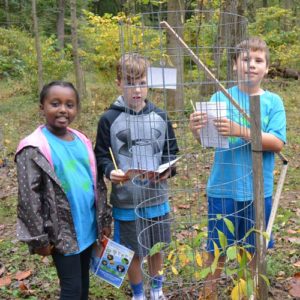
“The field notebook is grade-appropriate and helps us model good science practice,” says Rene Rodriquez, the science advocate at Westtown Thornbury Elementary. “I have been very impressed with the quality of experience that the Stroud Center has provided our students. The [educators] are very knowledgeable and experienced working with elementary students; this is evident in how they relate with the children.”
By 2018, the Stroud Center had become an annual outdoor field experience for fourth graders across the district that did not end when students departed the Stroud Center. Instead, WCASD administrators like Joyce collaborated with Stroud Center educators to craft a four-day mini-unit for fourth-grade students before and after their field trip.
“This corresponds with our philosophy that while one-time visits to environmental education centers are valuable, more learning can be achieved,” says Joyce. “By creating a full unit that corresponds to the one-day field experience at the Stroud Center, we provided more opportunities for educational relevance, such as students’ deeper understanding of the concepts and stronger connections to real-world science.”
The Partnership Expands
With the organizations’ feet wet for community-driven partnership, Joyce collaborated with Steve Kerlin, Ph.D., Stroud Center director of education, to expand student learning beyond the fourth-grade level. Together in 2018, Joyce and Kerlin submitted an environmental education grant proposal to the Pennsylvania Department of Environmental Protection (DEP) to grow watershed education capacity for WCASD’s middle school watershed education curriculum. The proposal was successful, with the awarded grant now funding forest enhancement efforts and an outdoor water quality education center at Stetson Middle School.
“We’re excited that the grant not only supports student focused watershed education and stewardship at Stetson Middle School,” says Kerlin. “It also funds WCASD’s revision of the watershed education curriculum for sixth graders across the district, with every teacher participating in this curricular revamp and Stroud Center educators lending our own unique perspectives.”
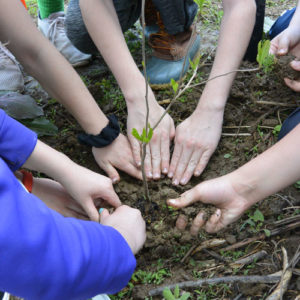
In spring of 2019, 300 sixth-grade students participated in DEP funded action projects to remove invasive species and plant more than 300 native trees, one tree for every Stetson Middle School student, followed by a field trip to the Stroud Center to bring their learning full-circle.
“Stroud Water Research Center was exceptional,” recalls Joe Dell’Arciprete, sixth-grade science teacher at Stetson Middle School. “Every student gained a greater understanding about the importance of our watershed and the various threats that can impact the quality of our water system. The staff provided an excellent program that was engaging for all of our students.”
The next phase of the grant includes the design and building of three outdoor classrooms by WCASD students and staff, including interpretive signs to help the community interact directly with the watershed.
Meanwhile, 120 eighth graders from WCASD visited the Stroud Center for field experiences in 2019, and at the high school level, the partners are integrating watershed education into the biology curriculum and developing a new elective course on freshwater ecology. WCASD high school biology teachers visit the Stroud Center for field trips of their own, gaining professional development during orientations to the WikiWatershed Toolkit, exposure to related freshwater learning tools, and shadowing of Stroud Center education programs for fourth-grade students. This reflects the shared vision of both partners: systemic and scaffolded K-12 education that follows students and staff through every stage of learning.
Watershed Education in One District Leaves a National Footprint
The partnership that began in one school district is growing further through the Pennsylvania Watershed Education Task Force, an initiative of the NOAA-funded Pennsylvania Environmental Literacy and Meaningful Watershed Educational Experience (MWEE) Programming Capacity-Building grant project for which Kerlin is the project lead. Joyce was selected as a Task Force representative in 2017.
“The partnership between WCASD and the Stroud Center education department has become a model for building formal and non-formal education partnerships in systemic watershed education,” says Kerlin, who collaborated with Joyce to design and lead the first MWEE training for Pennsylvania school administrators in 2019. “We continue to share this model partnership throughout our capacity-building efforts statewide and nationally.”
Get Involved
Our educators have developed extensive resources for educating adults and students grades 4 and up about watersheds and their importance. On-site and off-site school and scout programs, professional development workshops, and community and family programs are just some of the available options. Visit stroudcenter.org/education for more information.

